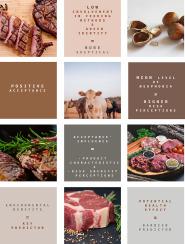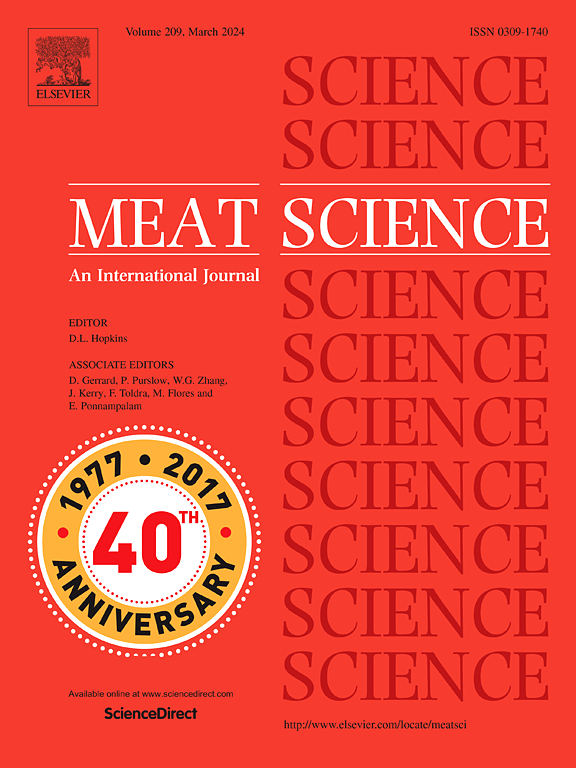消费者对榛子皮喂养牛肉的态度、看法和意愿。
IF 7.1
1区 农林科学
Q1 Agricultural and Biological Sciences
引用次数: 0
摘要
消费者对动物性食品生产中使用的饲养制度的道德和社会可接受性表示担忧。然而,从消费者的角度来看,使用农工副产品(如榛子皮)作为减少畜牧业生产对环境影响的一种策略可能会受到负面评价。在此,我们调查了消费者对榛子皮肉的意向预测因素。我们通过一家在线市场调研小组提供商招募了 900 名意大利普通肉类消费者。我们向消费者展示了三种不同的肉类产品,即用食品工业副产品喂养的肉类产品与具有饲料质量或环境效益的肉类产品。当消费者被告知该产品有助于促进可持续生产、减少食物浪费或提高饲料质量时,他们普遍对该产品做出了积极的回应,而不同框架之间并无显著差异。对饲养方法不十分关心、绿色自我认同感较低的消费者往往对替代饲料的使用持怀疑态度。恐新症的程度对受访者的风险认知有很大影响。我们的研究结果表明,产品特性以及风险和利益认知将极大地影响人们对榛子皮作为饲料原料的接受程度。环境效益 "是预测 "是否愿意尝试 "的关键因素,而对潜在健康影响的担忧则被认为是接受新型饲料替代品的主要障碍。这项研究证实,亟需对消费者进行教育,以便在生产系统层面为消费者提供环保的肉类选择。本文章由计算机程序翻译,如有差异,请以英文原文为准。

Consumers' attitudes, perceptions and willingness to try hazelnut skins-fed beef
Consumers are raising concerns over the ethical and social acceptability of feeding regimes used in animal-based food productions. However, the use of agro-industrial by-products, such as hazelnut skins as a strategy to reduce the environmental impact of livestock production may be negatively perceived from the consumer's perspective. Here, we investigated the factors predicting consumers' intentions to try meat obtained from cattle fed hazelnut skins. Nine hundred Italian regular meat consumers were recruited via an online provider of market research panels. Three different framings were presented to consumers as meat products fed with food industry by-products vs possessing either feed quality or an environmental benefit. Consumers generally responded positively to the product when they were informed that it helps promote sustainable production, reduces food waste, or improves feed quality, with no significant difference between framings. Consumers who reported not to be very concerned about feeding methods and to have a low green self-identity tended to be more skeptical towards the use of alternative feeds. The level of neophobia significantly influenced the respondents' risk perceptions. Our findings suggest that product characteristics and risk and benefit perceptions will significantly influence the acceptance of hazelnut skins as feed ingredient. The factor “environmental benefits” was a key predictor of “willingness to try”, while concerns about the potential health effects were identified as a major barrier to accepting novel feed alternatives. This research confirms the great need to educate consumers in order to empower meat choices that are environmentally friendly at the production system level.
求助全文
通过发布文献求助,成功后即可免费获取论文全文。
去求助
来源期刊

Meat Science
工程技术-食品科技
CiteScore
12.60
自引率
9.90%
发文量
282
审稿时长
60 days
期刊介绍:
The aim of Meat Science is to serve as a suitable platform for the dissemination of interdisciplinary and international knowledge on all factors influencing the properties of meat. While the journal primarily focuses on the flesh of mammals, contributions related to poultry will be considered if they enhance the overall understanding of the relationship between muscle nature and meat quality post mortem. Additionally, papers on large birds (e.g., emus, ostriches) as well as wild-captured mammals and crocodiles will be welcomed.
 求助内容:
求助内容: 应助结果提醒方式:
应助结果提醒方式:


